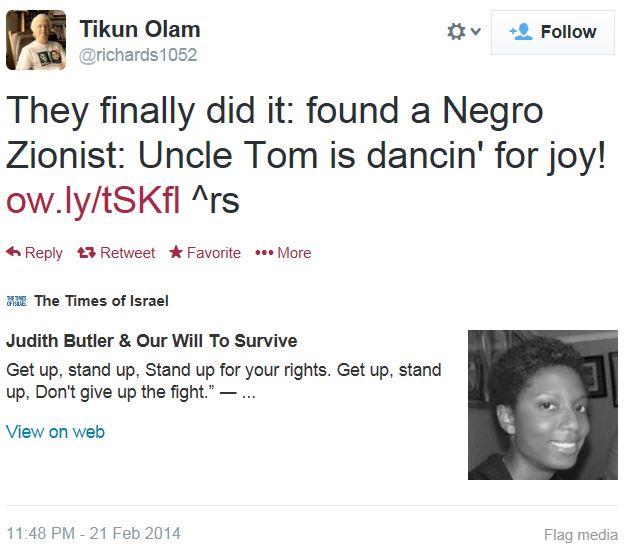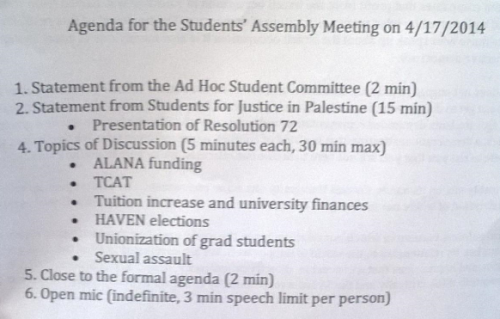No takers on my debate challenge to Vassar pro-boycott faculty, but I’m still going
The Case for Israel and Academic Freedom still will be made....
The Case for Israel and Academic Freedom still will be made....
 A funny thing then happened. The tweet was deleted, rendering this image at the Truth Revolt post:
A funny thing then happened. The tweet was deleted, rendering this image at the Truth Revolt post:
 She also is a frequent target of other anti-Zionist fanatics who find a unique threat in a black American female Zionist, because dividing people along racial lines is a key anti-Israel boycott tactic.
In this interview at the AIPAC conference, Valdary explains how she has dealt with the attacks, how her Zionism is consistent with that of the great civil rights leaders of the 1960s and why (at 2:20):
She also is a frequent target of other anti-Zionist fanatics who find a unique threat in a black American female Zionist, because dividing people along racial lines is a key anti-Israel boycott tactic.
In this interview at the AIPAC conference, Valdary explains how she has dealt with the attacks, how her Zionism is consistent with that of the great civil rights leaders of the 1960s and why (at 2:20):
"As a free woman of color, of course I would be a Zionist, it's only natural"Valdary also discussed her own experiences in Israel, and the modern blood libel that Israel is an Apartheid state (at 8:45):
"There is no Apartheid in Israeli society ... it's an insult to the people who suffered from Apartheid in South Africa"(Via CiFWatch) Valdary goes into even more depth about the racism of the anti-Israel left in this interview:
“We therefore categorically reject the argument that a vendor has a right under the Constitution or otherwise to send unwanted material into the home of another…. That we are often ‘captives’ outside the sanctuary of the home and subject to objectionable speech and other sound does not mean we must be captives everywhere.”So what is NYU going to do?
Background on the American Studies Association boycott and how it's playing out...
Mock eviction notices slid under doors in dorm known to have high concentration of Jewish students, including only "Shabbat elevator"...
Students for Justice in Palestine reinstated on probation for the fall semester, after agreeing to modify its conduct...
I had the pleasure of appearing tonight on The Mark Levin Show. We covered the anti-Israel boycott movement, and why it should matter to conservatives. Thanks to Mark for shining a spotlight on this issue. Thanks also to our friends at The Right Scoop for pulling the audio...
I challenge any or all of the 39 Vassar faculty who signed a letter defending the academic boycott of Israel to debate me on May 5....
 The only interesting part was that David Skorton, President of Cornell, previously was scheduled to appear before the Assembly, and kept that appointment. So the President was present during part of this alternative assembly, but not because of the protest.
There were some minor theatrics as protestors vented a little, but nothing major. Skorton gave a short speech about improving the process, and left:
The only interesting part was that David Skorton, President of Cornell, previously was scheduled to appear before the Assembly, and kept that appointment. So the President was present during part of this alternative assembly, but not because of the protest.
There were some minor theatrics as protestors vented a little, but nothing major. Skorton gave a short speech about improving the process, and left:
A repeat of what happened at U. Michigan?...
Also, ASA's new individual membership numbers may not be what they seem....
Assuming Cross [aka Glenn Miller] linked to Blumenthal’s conspiracy theories about the 2012 election, would that mean Blumenthal is responsible for the Overland Park shooting? Absolutely not. Is the intersection between neo-Nazi and anti-Zionist conspiracy theories worthy of examination? Absolutely. We have seen in Europe in particular how anti-Semitism and anti-Zionism go hand-in-hand, often based on conspiracy theories about Jewish and Israeli influence. [image omitted] Those types of consipiracy theories regarding the alleged manipulations of Jewish money and interests are as old as hate itself. That is a fair subject of discussion. I wonder if the mainstream media will go there, as it did in the Norway shooting.Others are more direct in drawing the connection between the shooter's adoration of Blumenthal's anti-Zionist conspiracy theories and the shooting, in part perhaps because Blumenthal tried to lay blame on some of them for the Norway shooting (Pipes, Geller):
Opposing BDS is a satisfaction in itself....
 Is race behind the attacks on Valdary? Yes, says an op-ed column in The NY Post by Anthony Hardy Williams, the Democratic whip in the Pennsylvania state Senate, whose father worked with Dr. Martin Luther King, Jr. and broke the color barrier at Penn State, The racism of the Israel-bashers:
Is race behind the attacks on Valdary? Yes, says an op-ed column in The NY Post by Anthony Hardy Williams, the Democratic whip in the Pennsylvania state Senate, whose father worked with Dr. Martin Luther King, Jr. and broke the color barrier at Penn State, The racism of the Israel-bashers:
Clearly, something has gone very wrong at Vassar....
Cornell Passover Divestment push not an isolated event....
Sneak Passover tactic fails, as motion to table the Divestment Resolution indefinitely passes....
Donations tax deductible
to the full extent allowed by law.
Founder
Sr. Contrib Editor
Contrib Editor
Higher Ed
Author
Author
Author
Author
Weekend Editor
Author
Editor Emerita

